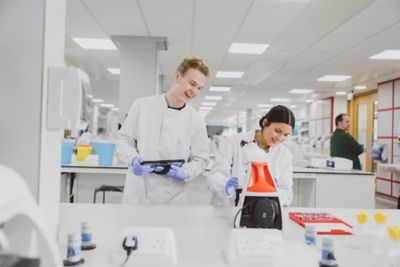An in-depth consideration of science and how it interacts with wider society, working as an interdisciplinary group to consider real-world problems.
This could include lab-based, bioinformatics, data analysis and systematic review/audit projects, all developing skills of scientific enquiry, literature review, experimental design, critical analysis, data capture, handling, analysis and the interpretation and presentation of results in various formats, including scientific writing (building on skills from years 1 and 2).
This module provides an in-depth exploration of the latest technological advancements in molecular biology, focusing on their transformative impact on scientific research and development. You’ll investigate how these cutting-edge tools are employed to tackle complex challenges in the biomedical sciences, gaining insight into their applications and effectiveness.
Throughout the module, emphasis is placed on understanding the practical application of these methods, as well as analysing and interpreting the resulting data. This comprehensive approach equips you with the knowledge and skills to navigate and contribute to the rapidly evolving field of molecular biology.
This module delves into the transformative intersection of biology, data science, and computational techniques, showcasing how big data is reshaping modern biological research. You’ll explore the principles of bioinformatics and computational biology, learning how to analyse large-scale biological datasets using cutting-edge tools and algorithms. Key topics include data mining, machine learning applications in biology, and effective data visualisation methods.
In addition, the module addresses the ethical considerations of working with biological data, fostering a critical understanding of this rapidly evolving field. By combining theoretical knowledge with practical applications, you’ll develop essential skills for navigating the complex world of biological big data.
In this module, you’ll examine the extensive ways human activities impact the environment and affect species health on a global scale. You’ll explore the distribution and biological effects of pollutants such as pharmaceuticals, heavy metals, pesticides, herbicides, and microplastics. The module also investigates how habitat loss and human-wildlife interactions influence pathogen transmission, gut microbiome dynamics, and parasitic infestations, offering insights into the ecological consequences of anthropogenic changes.
You’ll delve into additional topics like the effects of natural toxins, volatile compounds, and climate-driven habitat shifts. Through case studies and critical discussions, you’ll gain a comprehensive understanding of how human actions disrupt ecosystems and biological health, equipping you with the knowledge to address these pressing environmental challenges.
In this module, you'll delve into the fascinating world of drug discovery and development, applying principles from pharmacology, neuroscience, and biochemistry. You'll explore the entire drug discovery process, from target identification and high throughput screening to target validation, safety pharmacology, and pharmacokinetics, culminating in clinical trials. You'll also investigate novel therapeutic targets for a range of diseases, including cardiovascular disease, obesity, immune diseases, cancer, respiratory disease, and neurological disorders.
By understanding the impact of disease on the pharmacokinetics of drugs and the pathophysiology of various conditions, you'll uncover new therapeutic targets. You'll learn to interpret in vivo drug data and predict human doses, equipping you with the skills to contribute to the development of new treatments. This module offers a comprehensive insight into the drug development process, preparing you for a career in the pharmaceutical and biomedical fields.
In this module, you’ll explore the biological processes behind ageing and their impacts on human physiology, health, and frailty. You’ll delve into the molecular and cellular mechanisms of ageing, investigating how they affect the entire body and contribute to age-related conditions such as osteoporosis, cardiovascular disease, diabetes, obesity, and liver diseases.
You’ll also examine how nutrition and exercise play critical roles in regulating metabolism and reducing disease risks. The module highlights their dual role in disease prevention, progression, and as therapeutic interventions. By evaluating strategies for promoting healthy ageing and managing diseases, you’ll gain valuable insights into supporting well-being throughout the ageing process.
This module delves into the principles and cutting-edge applications of imaging technologies within biological and biomedical sciences. You’ll gain theoretical knowledge of key imaging techniques and explore their practical applications in both research and industry, discovering how they contribute to advancements across the life sciences.
A strong focus is placed on critically evaluating the role of imaging in deepening our understanding of biological systems. By engaging with these technologies, you’ll develop the skills and insight needed to assess their impact and potential in transforming the field of life sciences.
In this module, you'll delve into the intersection of anatomical sciences and innovative technologies, designed specifically for third-year students. You'll deepen your understanding of human anatomy while developing expertise in the use of cutting-edge tools and techniques. This module will provide you with a comprehensive overview of anatomical structures and functions, integrating advanced technological methods to enhance your learning experience.
By exploring the latest advancements in imaging and diagnostic technologies, you'll gain practical skills in applying these tools to anatomical studies. You'll learn how innovative technologies can be used to investigate and understand complex anatomical systems, preparing you for a career in medical research, healthcare, or related fields. This module will equip you with the knowledge and skills to leverage modern technologies in the study of human anatomy.
This module explores the complex dynamics of pathogen-host interactions, focusing on how medical interventions can combat diseases. You’ll delve into the principles of vaccinology, gaining an understanding of how vaccines are designed to prevent infections or diseases. The module also examines alternative therapies to antibiotics for treating bacterial infections, offering insight into innovative approaches to tackling microbial threats.
Using examples from microorganisms such as bacteria, viruses, protozoa, and fungi, you’ll analyse pathogens that pose significant global challenges. You’ll also explore the latest advances in vaccines and therapies, including their limitations and potential future solutions, equipping you with knowledge at the forefront of infectious disease research and treatment.
In this module, you'll integrate the scientific knowledge you've acquired throughout your degree, focusing on how this knowledge informs policy decisions and shapes societal outcomes through effective public engagement. You'll explore the intersection of science and policy, learning how to communicate complex scientific concepts to various stakeholders to foster positive societal impacts.
The module aims to further develop your transferable skills, including critical thinking, reflection, and presentation to both lay and professional audiences. You'll enhance your communication and teamwork abilities, learning to effectively convey scientific knowledge to different stakeholders. By the end of the module, you'll be well-equipped to use your scientific expertise to influence policy and engage with the public meaningfully.
This module examines the transformative power of genomics and its real-world applications, from revolutionising medicine and disease tracking to advancing conservation and evolutionary biology. You’ll explore how genomic technologies offer insights into healthcare innovation and trace the origins of species, shedding light on processes such as adaptation, speciation, and their relevance to modern populations.
The module also highlights the pivotal role of genomics in conservation, showing how genetic data helps monitor biodiversity, protect endangered species, and support ecosystem restoration. By connecting these diverse topics, the module demonstrates how genomics addresses critical challenges in human health, environmental conservation, and industrial applications, providing a holistic view of its impact across multiple fields.
This module delves into advanced concepts of tumourigenesis and tumour progression, providing insights into the molecular and cellular mechanisms behind tumour development. You’ll explore the multistep nature of tumour progression, its divergence from normal biological development, and key topics such as tumour immunology, tumour evolution, and the tumour microenvironment.
The module places a strong emphasis on cancer research, highlighting how understanding the fundamentals of cancer biology contributes to the creation of innovative therapies. You’ll also examine the biochemical foundations of cancer treatments, including chemotherapy and immunotherapy, offering a comprehensive view of how cutting-edge science drives advancements in cancer care.




